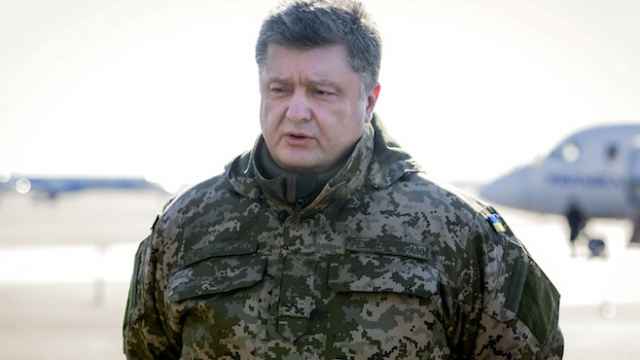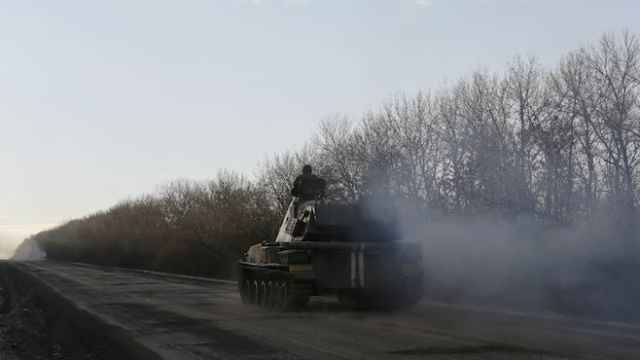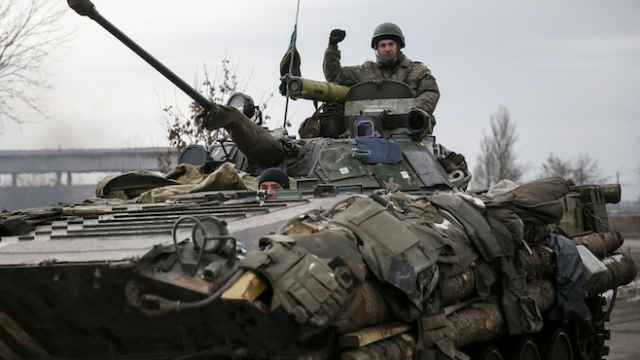The loss of the key town of Debaltseve to Russian-backed separatists, the latest in a string of big battlefield defeats for Ukraine, narrows the options for President Poroshenko in his dealings both with Moscow and with the West.
No sooner did the strategic railway junction fall to the rebels on Wednesday, with thousands of Ukrainian soldiers withdrawing under fire, than separatists re-opened another old front, attacking government positions near Mariupol, a strategic coastal city in the south-east.
The grim message, it seems, was: 'There's more to come. The break-up of Ukraine does not stop here.'
All this hit national morale as Ukraine marked the first anniversary of pro-Moscow president Viktor Yanukovich's overthrow and the killings of 100 people protesting against his policy swerve away from Europe back to the old master, Russia.
What started as a popular revolt a year ago against a leader ready to renounce his country's future in Europe seems to be turning into the break-up of the country.
The nightmare confronting Poroshenko now is that, while Western governments want him to stick to a peace formula worked out at a four-power summit, the Kremlin-backed separatists could move on to take Mariupol and eventually link up with Crimea, annexed by Russia last March.
And would the land-grab stop there?
Battlefield Firepower
The 49-year-old confectionery tycoon, who took office last June expressing the hope that the rebellion in the east would be over in weeks, has few good options.
The humiliation of Debaltseve exposed again his army's lack of firepower to defend strategic objectives against a separatist army boosted by Russian fighters, directed by Russian intelligence and armed with modern Russian weapons that roll across the border with impunity.
The fall of Debaltseve followed the loss of more than 100 Ukrainian lives at Illovaisk last August when Kiev's troops were encircled and the seizure in January of the airport complex in Donetsk, a big prize for the rebels.
With Mariupol the separatists' next target, Poroshenko sees more territory drifting out of Kiev's control — knowing that winning it back could only come at a high price. Another heavy military defeat would be a serious blow to his leadership.
But his Western supporters in Germany and France are pressing him to give up dreams of securing U.S. weapons to seize back lost territory and press on with the peace deal struck in Minsk last week.
Meanwhile, his adversary, Russia's Vladimir Putin, is making Ukraine more and more ungovernable and less of an attractive prospect for Europe.
Like many in the West, Poroshenko's main hope seems to be that the threat of further Western sanctions may make Putin pause. Poroshenko has in the meantime said Ukraine will make an appeal for a UN peacekeeping force to monitor the Ukraine-Russia border.
But few in Kiev believe that any peacekeeping mission — which might be blocked anyway by Russia — will change much.
"One scenario is the introduction of a peacekeeping contingent particularly for control of the border," said political analyst Olesya Yakhno.
"The second is escalation of military action. There are no peaceful options left," Yakhno said.
"Poroshenko will continue with some delicate balancing between the military and political options. An adequate political solution, which will help stop this war, has to be found."
Poroshenko has little chance of selling any compromise at home that accepts self-rule for the separatists and tacit acceptance of Russia's annexation of Crimea.
That is particularly so with popular sentiment running high on the first anniversary of events which Ukrainians regard as a pivotal moment in their bid to ditch their Soviet past and become part of Europe.
Candles were lit for the dead in churches, offices and workplaces across Ukraine ahead of a memorial service on Kiev's Independence Square, where protesters were shot dead.
Chain Reaction
Yanukovich's ousting, which Moscow calls a "fascist" coup, triggered Russia's annexation of Crimea and the separatist rebellion, backed by Moscow, which has led to a conflict in which more than 5,000 people have died.
Poroshenko, Putin and the leaders of Germany and France came out of peace talks in Belarus on Feb. 12 announcing a cease-fire deal.
German Chancellor Angela Merkel and French President Francois Hollande still see life in the Minsk agreements, which also called for withdrawal of heavy weapons by both sides.
But after Debaltseve, the deal lies in tatters and Kiev is braced for fresh rebel attacks.
A significant part of Poroshenko's quandary is that he cannot jeopardize links with the West. The IMF and potential Western donor governments are offering billions of dollars of aid but only if Ukraine reforms.
Putin appears to want to create as much instability as possible in Ukraine, with the east beyond the writ of Kiev, and dooming any prospect of the country joining NATO and the European Union.
The depressed industrial east has been in a downward spiral for years, with high unemployment and many of its old coal mines collapsed or operating dangerously.
Leaving it as a dysfunctional, self-ruling oddity in Ukraine under the protection of Russian-backed forces, but for Kiev to support financially, fits Putin's strategy perfectly.
A Message from The Moscow Times:
Dear readers,
We are facing unprecedented challenges. Russia's Prosecutor General's Office has designated The Moscow Times as an "undesirable" organization, criminalizing our work and putting our staff at risk of prosecution. This follows our earlier unjust labeling as a "foreign agent."
These actions are direct attempts to silence independent journalism in Russia. The authorities claim our work "discredits the decisions of the Russian leadership." We see things differently: we strive to provide accurate, unbiased reporting on Russia.
We, the journalists of The Moscow Times, refuse to be silenced. But to continue our work, we need your help.
Your support, no matter how small, makes a world of difference. If you can, please support us monthly starting from just $2. It's quick to set up, and every contribution makes a significant impact.
By supporting The Moscow Times, you're defending open, independent journalism in the face of repression. Thank you for standing with us.
Remind me later.





